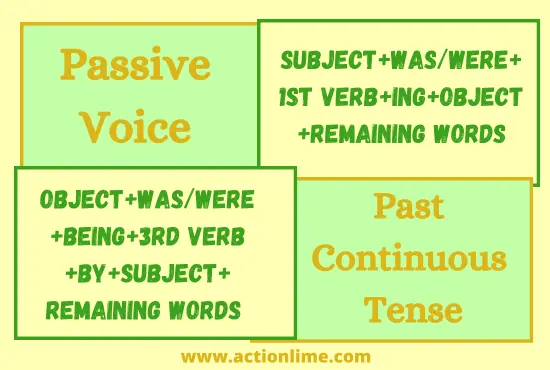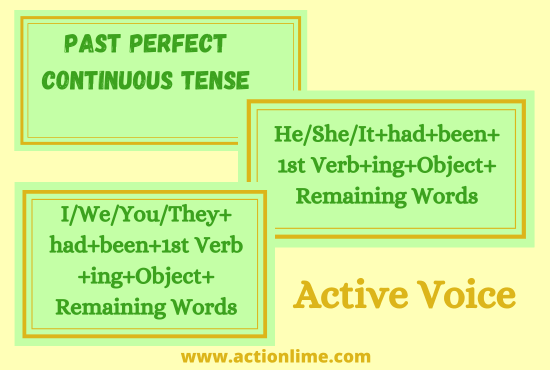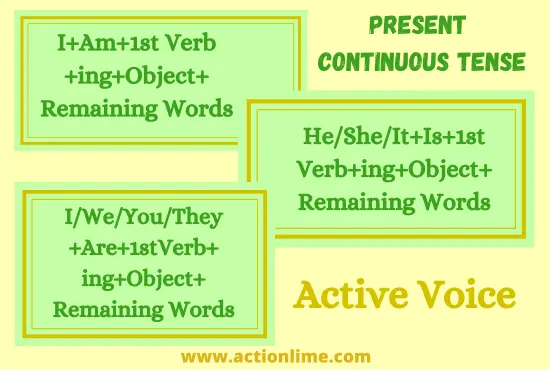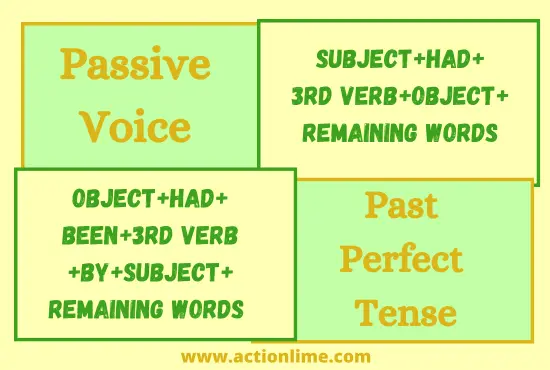Present Perfect Tense|Passive Voice
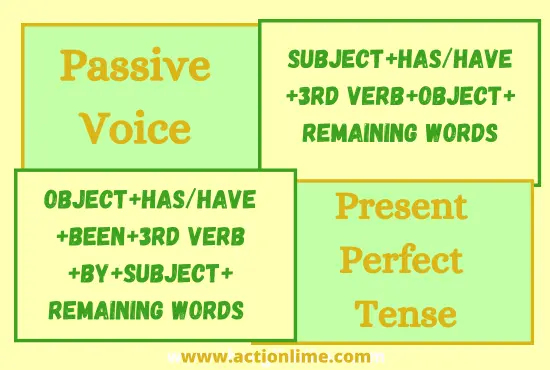
Present Perfect Tense(Passive Voice) is used to represent the passive completed actions of the present time. Active Voice Sentences of Present Perfect Tense can be converted to Passive Voice Sentences of Present Perfect Tense, just by following the following General Rules.
Rules to Convert Present Perfect Tense(Active Voice) Sentences to Passive Voice Sentences
Following are some rules, through which one can easily convert Active Voice Sentences of Present Perfect Tense into Passive Voice.
- First of all, convert the Object(me, us, you, them, him, her, it) of the Active Voice Sentences into the Subject(I, we, you, they, he, she, it) of the Passive Voice Sentences.
- Then, use has been/have been” as a helping verb to show the completeness of the present-time passive actions.
- Then, use the 3rd Verb to show that action is being completed on the object.
- After that, use the preposition “by”, to indicate the actual doer of the action.
- And then write by converting the Subject(I, we, you, they, he, she, it) into Objective Case(me, us, you, them, him, her, it).
- At the end, write the remaining words, if there are any in the Active Voice Sentences of the Present Perfect Tense.
Helping Verbs of Present Perfect Tense(Passive Voice)
The following 2 helping verbs can be used in Present Perfect Tense(Passive Voice) Sentences, to indicate the passive completed actions of the present time.
“Has been” As a Helping Verb in the Present Perfect Tense(Passive Voice)
“Has been” is used as a helping verb in Present Perfect Tense(Passive Voice) Sentences with Singular Number Nouns and Pronouns(He, she, it). Thus, Passive Voice Sentences with “has been” as a helping verb, have the following Sentence Structure/ Structural formula.
Singular Number Nouns/Pronouns+ has+ been+ 3rd Verb+ by+ Subject+ Remaining Words
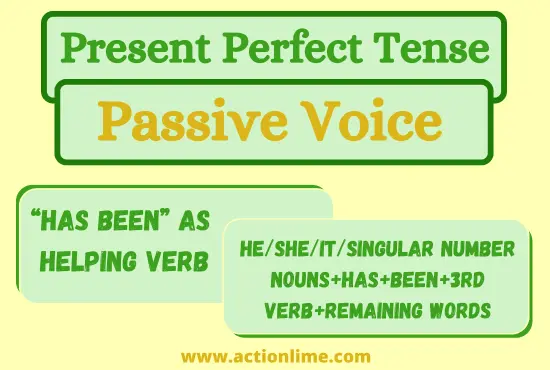
“Have been” As a Helping Verb in the Present Perfect Tense(Passive Voice)
“Have been” is used as a helping verb with Plural Number Nouns and with some singular Pronouns (I, You), and also with some Plural Pronouns(We, You, They) in the Present Perfect Tense(Passive Voice) Sentences. Thus, Passive Voice Sentences of Present Perfect Tense with “have been” as a helping verb have the following Sentence Structure formula.
I/we/you/they/Plural Nouns+ have+ been+ 3rd Verb+ by+ Subject+ Remaining Words

Sentence Structure of Present Perfect Tense(Passive Voice)
Following are Sentence Structural formulas for Assertive, Negative, Interrogative, and Negative-Interrogative Sentences.
Assertive Sentence Structure of Present Perfect Tense(Passive Voice)
Assertive Sentences of Present Perfect Tense(Passive Voice) take “has been/have been” as helping verbs with respective Singular and Plural Numbers of Nouns and Pronouns to indicate the passive completed actions of the present time. Thus, Assertive Sentences of Present Perfect Tense(Passive Voice) have the following Sentence Structure.

Examples of Assertive Sentences of Present Perfect Tense(Passive Voice)
Following are some examples of Assertive Sentences of Present Perfect Tense(Passive Voice).
- I have lost my wristwatch.
- My wristwatch has been lost by me.
- We have seen a cobra.
- A cobra has been seen by us.
- You have painted these pictures.
- These pictures have been painted by you.
- They have written a letter.
- A letter has been written by them.
- He has laid an egg.
- An egg has been laid by him.
- She has tested his eyes.
- His eyes have been tested by him.
- The computer has processed the data.
- The data has been processed by the computer.
- She has given me a beautiful gift.
- I have been given a beautiful gift by her.
- A beautiful gift has been given to me by her.
- The company has awarded us a bonus.
- We have been awarded a bonus by the company.
- A bonus has been awarded to us by the company.
- He has told you the news.
- You have been told the news by him.
- The news has been told to you by him.
- You have shown them a great kindness.
- They have been shown great kindness by you.
- A great kindness has been shown to them by you.
- My friends have invited him to their party.
- He has been invited by my friends to their party.
- The project team has included her in the discussion.
- She has been included by the team project in the discussion.
- The researcher has discovered a new species.
- A new species has been discovered by the research.
Negative Sentence Structure of Present Perfect Tense(Passive Voice)
Negative Sentences of Present Perfect Tense(Passive Voice) takes “not” between the helping verb “has/have” and “been”, to show the negative nature of passive completed actions of the present time. Thus, Negative Sentences of Present Perfect Tense(Passive Voice) have the following Sentence Structure.

Examples of Negative Sentences of Present Perfect Tense(Passive Voice)
Following are some examples of Negative Sentences of Present Perfect Tense(Passive Voice).
- I have not sent a telegram to her.
- A telegram has not been sent by me to her.
- We have not visited London twice.
- London has not been visited twice by us.
- You have not broken this cup.
- This cup has not been broken by you.
- They have not cut grass.
- Grass has not been cut by them.
- He has not obtained passing marks in Persian.
- Pass marks have not been obtained by him in Persian.
- She has not lent him any money.
- Some money has not been lent him by her.
- He has not been lent some money by her.
- The storm has not damaged several houses.
- Several houses have not been damaged by the storm.
- She has not given me a lot of support.
- I have not been given a lot of support by her.
- A lot of support has not been given to me by her.
- They have not sent us the documents.
- We have not been sent the documents by them.
- The documents have not been sent to us by them.
- The organization has not awarded you a certificate.
- You have not been awarded a certificate by the organization.
- A certificate has not been awarded to you by the organization.
- The teacher has not assigned them a challenging task.
- They have not been assigned a challenging task by the teacher.
- A challenging task has not been assigned to them by the teacher.
- Someone has not offered him a great deal.
- He has not been offered a great deal by someone.
- A great deal has not been offered to him by someone.
- You have not shown her the way to the station.
- She has not been shown by you the way to the station.
- The way to the station has not been shown to her by you.
- The government has not implemented new regulations.
- New regulations have not been implemented by the government.
Interrogative Sentence Structure of Present Perfect Tense(Passive Voice)
Interrogative Sentences of Present Perfect Tense(Passive Voice) takes helping verbs “has/have”, at the start of Passive Sentences to show the interrogative/questionable nature of the passive completed actions of the present time. And “been” comes after the object of the sentence to show the passive nature of the completed action. Thus, Interrogative Sentences of Present Perfect Tense(Passive Voice), have the following Sentence Structure.

Examples of Interrogative Sentences of Present Perfect Tense(Passive Voice)
Following are some examples of Interrogative Sentences of Present Perfect Tense(Passive Voice).
- Have I milked the cow?
- Has the cow been milked by me?
- Have we issued three tickets?
- Have three tickets been issued by us?
- Have you locked him?
- Has he been locked by you?
- Have they ridden the horse?
- Has the horse been ridden by them?
- Has he published the result?
- Has the result been published by him?
- Has she married to a doctor?
- Has a doctor been married to by her?
- Has the committee proven the new policy?
- Has the new policy been proved by the committee?
- Had she given me a ride home?
- Have I been given by her a ride home?
- Has he told us the secret?
- Have we been told the secret by him?
- Has the secret been told to us by him?
- Have they shown you the correct method?
- Have you been shown by them the correct method?
- Has the correct method been shown by them?
- Has the instructor assigned them extra homework?
- Have they been assigned extra homework by the instructor?
- Has extra homework been assigned to them by the instructor?
- Have our neighbors invited him to the barbecue?
- Has he been invited to the barbecue by our neighbors?
- Has the judge awarded her the prize?
- Has she been awarded the prize by the judge?
- Has the prize been awarded by the judge?
- Has the machine produced excellent results?
- Have excellent results been produced by the machine?
Negative-Interrogative Sentence Structure of Present Perfect Tense(Passive Voice)
Negative-Interrogative Sentences of Present Perfect Tense(Passive Voice) take “has/have” at the start of Sentences to show the interrogative/questionable nature of the negative passive completed actions of the present time. And “not” comes after the Object of the Sentence to show the negative nature of interrogative action. Thus, Negative-Interrogative Sentences of Present Perfect Tense(Passive Voice) have the following Sentence Structure.
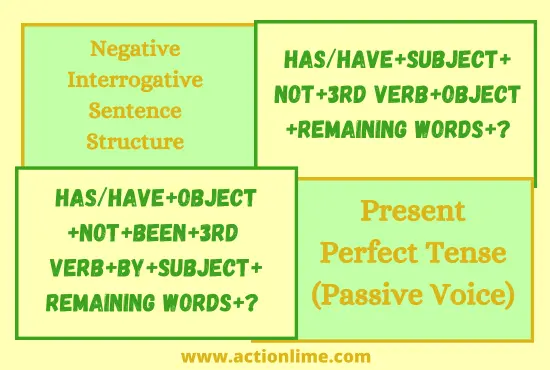
Examples of Negative-Interrogative Sentences of Present Perfect Tense(Passive Voice)
Following are some examples of Negative-Interrogative Sentences of Present Perfect Tense(Passive Voice).
- Have I not bought this house?
- Has this house not been bought by me?
- Have we not repaired the car?
- Has the car not been repaired by us?
- Have you not broken the cup?
- Has the cup not been broken by you?
- Have they not opened the door?
- Has the door not been opened by them?
- Has he not helped us?
- Have we not been helped by him?
- Has she not beaten her brother?
- Has her brother not been beaten by her?
- Has the book not inspired many readers?
- Have many readers not been inspired by the book?
- Has she not given me a gift?
- Have I not been given a gift by her?
- Has a gift not been given to me by her?
- Have they not informed us about the meeting?
- Have we not been informed by them about the meeting?
- Have we not invited you to our wedding?
- Have you not been invited by us to our wedding?
- Has the manager not praised them for their homework?
- Have they not been praised by the manager for their homework?
- Has the teacher not assigned him extra homework?
- Has he not been assigned extra homework by the teacher?
- Has extra homework not been assigned to him by the teacher?
- Have your friends not called her several times?
- Has she not been called for several times by your friends?
- Has the company not launched a new product?
- Has a new product not been launched by the company?

